It’s all about the mood. Films reviewed: Bob Marley: One Love, The Taste of Things
Hi, this is Daniel Garber at the Movies for culturalmining.com and CIUT 89.5 FM.
Many film critics — including myself — say that the most important part of a movie is the story. But that’s not always true. This week, I’m looking at two new movies where it’s all about the vibe, all about the mood, not the plot. There’s a cook cooking in 19th century France, and a musician making music in 1970s Jamaica.
 Bob Marley: One Love
Bob Marley: One Love
Dir: Reinaldo Marcus Green
It’s 1976, in Kingston Jamaica. Bob Marley (Kingsley Ben-Adir) and the Wailers are riding high with a string of worldwide hits. But the city is in turmoil, rocked by gang violence in the run up to a crucial election. US guns are flooding into the country. Bob Marley plans a “Smile Jamaica” concert to bring peace and lessen the tension between supporters of the leftist PM Manning and the pro-American conservative candidate Seaga. Bob — known as Skipper to his friends — is Rastafari, an anti-colonialist, afrocentric religion calling for a return to Africa from Babylon. But just days before the concert, Bob, Rita Marley (Lashana Lynch), and others were shot and wounded in a planned assassination attempt, with cars full of armed gang members invading their compound to stop them from singing. The concert goes through as planned, but they are forced to move to London for safety.
There, they put together their next album, Exodus, and embark on a tour of Europe, to be followed by a triumphant trip to Africa, Bob Marley’s dream. The album is a  huge hit, and his fame grows. But there’s trouble brewing between Bob and Rita, who have known each other since they were kids. They also face financial questions — are they being cheated out of their money by backroom management? And a wound to his foot from a soccer game isn’t healing like it should. Can Bob and Rita work out their problems? Will they ever make it to Africa? And can Bob Marley and the Wailers return to Jamaica and live in peace?
huge hit, and his fame grows. But there’s trouble brewing between Bob and Rita, who have known each other since they were kids. They also face financial questions — are they being cheated out of their money by backroom management? And a wound to his foot from a soccer game isn’t healing like it should. Can Bob and Rita work out their problems? Will they ever make it to Africa? And can Bob Marley and the Wailers return to Jamaica and live in peace?
Bob Marley: One Love is the long-awaited biopic about the musician and his life. Aside from a few flashbacks to his childhood and his start as a musician, the film focuses on two years of his life in the 1970s. So we see the musicians playing, in studio and at stadium concerts, hanging out in nightclubs and concert halls, or writing new songs at home. We also see them smoking spliffs (a Rastafarian sacrament) and playing soccer or fussball in their off hours. But what we don’t get much of is Bob Marley’s inner thoughts, his love life, his heart and soul. This is a common problem in hagiographic biopics that are approved every step off the way by his family.
 Bob Marley is sanctified, but not humanized — there seems to be a glass wall separating the audience from the character. At the same time, there are some fascinating revelations about his past, and interesting glimpses into the workings of Jamaican music scene (mainly through flashbacks). So we get to see Scratch Perry in studio, and the Wailers grooving on stage. The script is not great, it drags a bit, but photography is quite pretty, and the acting (largely played by British actors speaking Jamaican patois) is believable. Most important of all is the music, which sets the vibe that keeps the film moving all the way to the finish.
Bob Marley is sanctified, but not humanized — there seems to be a glass wall separating the audience from the character. At the same time, there are some fascinating revelations about his past, and interesting glimpses into the workings of Jamaican music scene (mainly through flashbacks). So we get to see Scratch Perry in studio, and the Wailers grooving on stage. The script is not great, it drags a bit, but photography is quite pretty, and the acting (largely played by British actors speaking Jamaican patois) is believable. Most important of all is the music, which sets the vibe that keeps the film moving all the way to the finish.
It’s the music that makes Bob Marley: One Love worth seeing.
 The Taste of Things (La passion de Dodin Bouffant)
The Taste of Things (La passion de Dodin Bouffant)
Co-Wri/Dir: Tran Anh Hung
It’s the late 19th century, in France. Eugenie (Juliette Binoche) is an haut cuisine cook at a chateau, surrounded by a lush vegetable garden. She’s preparing an elaborate meal for Dodin (Benoît Magimel) and his fellow gourmets. She’s assisted by Violette, the maid, and supervised by Dodin. And what a meal it is, with each dish requiring multiple stages, and dozens of steps. Even something as simple as consommé is actually a complex, refined broth known for its subtle flavours. We follow each step, from picking vegetables in the garden, to sautéing the meat, simmering it, and removing the scum.
This day, there’s a new face in the kitchen, Violette’s young niece. Pauline (Bonnie Chagneau-Ravoire) has a preternatural ability to taste all the elements of a dish, despite not yet developing a refined palate. Perhaps she’ll become Eugenie’s apprentice some day? In the meantime Eugenie takes pains to hide her occasional dizzy spells.
After 20 years, Dodin and Eugenie have an unusual relationship; they work together,  effortlessly in the kitchen, like a well oiled machine. And at night, if she chooses to do so, Eugenie leaves her chamber unlocked so Dodin can spend the night.
effortlessly in the kitchen, like a well oiled machine. And at night, if she chooses to do so, Eugenie leaves her chamber unlocked so Dodin can spend the night.
But it’s hard to tell if they are lovers, boss and worker, or husband and wife (with all that entails). What future dishes will they prepare? And will they ever tie the knot?
The Taste of Things is a mouth-watering look at 19th century French cooking. It’s nominally about a relationship, but not really. There’s also a visit to dine with a wealthy prince, and a look at strange new gardening techniques. But the plot is unimportant. As I watched this movie, I wasn’t thinking about why Eugenie has dizzy spells, or trying to keep track of Didot’s gourmet friends. It’s inconsequential.
It’s the food that’s important, the cooking and the eating. I was kept drooling for two hours, trying to guess what they’re making. Oh, that’s vol au vent! What’s with the meringue? Is it Baked Alaska? (a.k.a. omelette à la norvégienne). I was mentally  cooking alongside the burbling, burnished copper pots on the wood-burning stove. And the eating is remarkable, too, including a scene where the gourmets cover their heads with white napkins as they consume a tiny songbird (known as ortalans) whole.
cooking alongside the burbling, burnished copper pots on the wood-burning stove. And the eating is remarkable, too, including a scene where the gourmets cover their heads with white napkins as they consume a tiny songbird (known as ortalans) whole.
Certainly, Binoche and Magimel have chemistry — apparently they were once a couple in real life — but not enough to carry the movie. It’s the food — and the mood — that makes watching it worthwhile.
Bob Marley: One Love and The Taste of Things are both playing now in Toronto; check your local listings.
This is Daniel Garber at the Movies, each Saturday morning, on CIUT 89.5 FM and on my website culturalmining.com.
Current cinema. Films reviewed: Babysitter, A Thousand and One, Dungeons & Dragons: Honor Among Thieves
Hi, this is Daniel Garber at the Movies for culturalmining.com and CIUT 89.5 FM.
This week, I’m looking at three new movies, a drama, an adventure-comedy and a sex-comedy. There’s a gang of thieves in the Middle Ages, a middle-aged couple in Québec with a seductive nanny, and a mom in Harlem with an undocumented son.
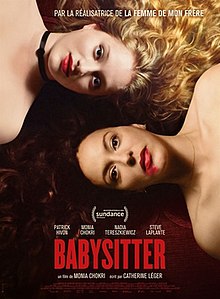 Babysitter
Babysitter
Wri/Dir: Monia Chokri
Cédric (Patrick Hivon) is a middle-class guy in a Montreal suburb, with an obsession with women’s breasts. He’s happily married with a newborn daughter but his sex life has completely dried up. Maybe that’s why, in a drunken stupor at a UFC fight, he throws himself at a sportscaster on live TV and kisses her. His immortal words Je t’aime Chantal! went viral, and made Cédric famous, but not in a good way. Now he’s on extended leave as the company investigates his sexual harassment. But with a colicky baby, neither he nor his wife on maternity leave Nadine (Monia Chokri) are getting any sleep: the baby never stops crying. So they hire a nanny named Amy (Nadia Tereszkiewicz) to take over some of the pressures of parenthood. And she has a magic touch with the baby, calming her down in an instant.
Amy is 22 years old with beautiful blonde hair and scarlet lips. She is  both innocent and seductive. And soon enough she has Nadine and Cédric under her thumb, with Jean-Michel, Cedric’s brother (Steve Laplante) close behind. But when she shows up the next day in a semi-pornographic “French maid” costume — compete with short skirt, white stockings and high heels — the three of them don’t whether to faint or explode. Will Amy save their marriage by releasing tension, or has she gone too far? Will Cédric ever learn from his misogynistic behaviour? Will Jean-Michel ever get a hold of himself? And why does Amy act like she does?
both innocent and seductive. And soon enough she has Nadine and Cédric under her thumb, with Jean-Michel, Cedric’s brother (Steve Laplante) close behind. But when she shows up the next day in a semi-pornographic “French maid” costume — compete with short skirt, white stockings and high heels — the three of them don’t whether to faint or explode. Will Amy save their marriage by releasing tension, or has she gone too far? Will Cédric ever learn from his misogynistic behaviour? Will Jean-Michel ever get a hold of himself? And why does Amy act like she does?
Babysitter is a funny and campy Québecois sex comedy. It’s done in the classic manner of French and Italian movies from the 60s where the arrival of an unexpected visitor disrupts a whole family, but updated for the “#MeToo” generation. It’s highly stylized done in a retro manner,  with bright red colours popping up in every frame, from lipstick to poppies in the garden. And the main characters’ sexual fantasies are played out in soft focus in their heads, like David Hamilton’s softcore porn of the 1970s. There’s even a gratuitous scene with a group of teenaged girls in hot pants and roller skates gliding down a suburban street, a new generation thumbing its collective nose at uptight middle age. And while the movie seems to be shown through the male gaze, filmmaker Monia Chokri adds a satirical feminist subtext, keeping it entirely tongue in cheek.
with bright red colours popping up in every frame, from lipstick to poppies in the garden. And the main characters’ sexual fantasies are played out in soft focus in their heads, like David Hamilton’s softcore porn of the 1970s. There’s even a gratuitous scene with a group of teenaged girls in hot pants and roller skates gliding down a suburban street, a new generation thumbing its collective nose at uptight middle age. And while the movie seems to be shown through the male gaze, filmmaker Monia Chokri adds a satirical feminist subtext, keeping it entirely tongue in cheek.
 A Thousand and One
A Thousand and One
Wri/Dir: A.V. Rockwell
It’s New York City in the early 1990s. Inez (Teyana Taylor) is a young hairdresser, just released from Riker’s. But when she goes back to her old neighbourhood, no one wants to talk to her and she can’t get her old job back. Worst of all, she is heartbroken to see her six-year-old son Terry maltreated by his foster parents. So one day she simply takes him away with her. And after a few weeks of couch surfing, they find a home in an old Harlem tenement, apartment number 1001. To keep them both safe from the law, she gets Terry a new social security number and a new name. He’s shy and rarely speaks but proves to be an excellent student, so much so his teacher helps him transfer to a highly competitive tech school for bright kids. Inez, meanwhile, gets back together with her boyfriend Lucky (William Catlett). Though he makes it clear he is not Terry’s father, eventually they marry and form a loving family. But life is not easy. They have to deal with an unscrupulous landlord, suspicious teachers and  aggressive cops. And always hanging over their heads is the fact they’re living under fake names and could be caught at any minute.
aggressive cops. And always hanging over their heads is the fact they’re living under fake names and could be caught at any minute.
A Thousand and One is a powerful, realistic and moving drama about the life of a family in Harlem in the 1990s and early 2000s. It’s both heartbreaking and inspiring. It traces their lives through changes of government, from Giuliani’s “Broken Windows” policy through Bloomberg’s “Stop and Frisk”, and how it affects Terry as a young Black man. It’s also a coming of age story, with three actors playing Terry at 6, 13 and 17 — Aaron Kingsley Adetola, Aven Courtney, and Josiah Cross — as he struggles through his best friend, his first crush, and his fractious relationship with his mother as they face the world. I love the period costumes, hair, locations and music. And Teyana Taylor is just amazing as Inez.
A Thousand and One is not a light movie, but it’s a good one.
 Dungeons & Dragons: Honor Among Thieves
Dungeons & Dragons: Honor Among Thieves
Co-Wri/Dir: John Francis Daley, Jonathan Goldstein
It’s sometime, somewhere far away in a mythical, mystical, medieval kingdom. Edgin and Holga (Chris Pine, Michelle Rodriguez) are former thieves locked up in a remote panopticon prison. They were caught trying to steal a magic totem but were double crossed by one of their gang. But they manage to escape. Now they want to form a new gang to pull off the ultimate heist: a charm that can bring Edgin’s wife back to life and restore his family including his daughter, Kira. Edgin is the brains, while Holga is the brawn, but they need more. They enlist Simon (Justice Smith) an insecure sorcerer with questionable powers (he earns his living picking pockets at a carnival side show.) Doric (Sophia Lilis) is a ginger-haired druid who can change, in a flash, into any animal she wants, from tiny worm to giant monster. And Xenk  (played by Bridgerton heartthrob Regé-Jean Page) — an honest and noble member of an evil clan — agrees to join the heist but only if its for good reasons, not for profit.
(played by Bridgerton heartthrob Regé-Jean Page) — an honest and noble member of an evil clan — agrees to join the heist but only if its for good reasons, not for profit.
But they must face their former ally Forge a con man (Hugh Grant). Up to now, he has taken care of Edgin’s little girl, but has since crowned himself King in alliance with a nefarious, all-powerful sorceress. To find his daughter, liberate the riches, and defeat the sorceress, the gang must first accomplish a series of nearly-impossible tasks, worthy of Theseus. Can this ragtag gang of miscreants pull it together? Or are they all headed back to prison?
Dungeons and Dragons: Honor among Thieves is a surprisingly entertaining adventure/comedy, based on the role-play board game of the same name. Players will delight in the more obscure references — from Gelatinous Cubes to Owlbears — but ordinary audiences can fully enjoy it without any background. It also incorporates the story-telling  aspects of the game, giving the whole film a rich, mythical feel. I went into this movie expecting nothing — previous Dungeons & Dragons incarnations have been dreadful. I shouldn’t have worried about this nerd paradise, seeing its co-written and directed by none other than John Francis Daley, from the TV cult classic Freaks and Geeks (he was a geek, of course). If you like Game of Thrones or Lord of the Rings, but with more laughs and less excessive gore and ponderous speeches, then you’ll love this one.
aspects of the game, giving the whole film a rich, mythical feel. I went into this movie expecting nothing — previous Dungeons & Dragons incarnations have been dreadful. I shouldn’t have worried about this nerd paradise, seeing its co-written and directed by none other than John Francis Daley, from the TV cult classic Freaks and Geeks (he was a geek, of course). If you like Game of Thrones or Lord of the Rings, but with more laughs and less excessive gore and ponderous speeches, then you’ll love this one.
Dungeons & Dragons: Honour among Thieves and A Thousand and One both open this weekend; check your local listings. Babysitter is playing at the Canadian Film Fest, on now.
This is Daniel Garber at the Movies, each Saturday morning, on CIUT 89.5 FM and on my website, culturalmining.com.
New Year Movies. Films reviewed: Babylon, Broker
Hi, this is Daniel Garber at the Movies for culturalmining.com and CIUT 89.5 FM.
This week I’m looking at two new movies to bring in the new year. There’s an abandoned baby in Busan, and excessive abandon of 1920s Hollywood.
Wri/Dir: Damien Chazelle (La La Land, Whiplash)
It’s a hot day in Santa Ana, near LA, in the 1920s. Manny (Diego Calva) has a strange job. He has to get an elephant through the desert to a mansion in time for a huge Hollywood party that night. There he meets Nellie LeRoy (Margot Robbie) an aspiring young actress who claims to be a movie star. She’s never actually been in anything yet but she says in Hollywood if you say you’re a star you are a star. The doorman is unimpressed but Manny, now in a sweaty tux, gets her through the door. Inside it’s a jazz-filled mayhem of half-naked dancers snorting cocaine as they prepare for their next writhing orgy. The guest of honour is Jack Conrad (Brad Pitt), Hollywood’s top moustachioed movie star.
Manny stays relatively sober but Nellie goes whole hog, successfully transforming herself into a wild-child party animal. Manny saves the day when he manages to sneak a dead body out of the party on behalf of the studio, without the gossip rags — including Photoplay’s notorious columnist (Jean Smart) — noticing. A woman died in a back room with a Fatty Arbuckle lookalike. By morning, both Manny and Nellie are invited to work on location on some movies being shot there; she as a starlet and he as a fixer, helping out in emergencies.
The movie follows the three of them — Manny, Nellie and Jack — as they make their way up and down Hollywood’s precarious ladder. Nellie is a smash hit — she can cry on cue in a tragedy, and minutes later turn herself into a laughing floozie in a western bar. Manny works behind the scenes, doing the dirty things the top producers shy away from. Jack is still the top star, but is gradually slipping at the box office, acting in one flop after another. has a meteoric rise but faces trouble when the talkies arrive. Manny makes his way to executive level, but likes himself less and less. Will Jack find a wife who loves him? Can Nellie lose her Jersey accent in time for the talkies? Which one of them will survive the dog-eat-dog world of the movie industry?
Hollywood’s precarious ladder. Nellie is a smash hit — she can cry on cue in a tragedy, and minutes later turn herself into a laughing floozie in a western bar. Manny works behind the scenes, doing the dirty things the top producers shy away from. Jack is still the top star, but is gradually slipping at the box office, acting in one flop after another. has a meteoric rise but faces trouble when the talkies arrive. Manny makes his way to executive level, but likes himself less and less. Will Jack find a wife who loves him? Can Nellie lose her Jersey accent in time for the talkies? Which one of them will survive the dog-eat-dog world of the movie industry?
Babylon is a very long but frenetically-paced movie about the early days of the motion picture industry. It recreates a version of that world with exquisite attention to detail — the music, the costumes, and incredible reenactments of the filming of war scenes and dance numbers using hundreds of extras. It gives you an uncommon, behind-the-scenes look at the silent movie era. Scenes in Babylon melt one into the next with cameras that lead you through tunnels, up staircases, from room to room in seemingly endless long shots. The story is part myth, part history. I’m guessing Chazelle found his inspiration in books like Kenneth Anger’s Hollywood Babylon, about the excessive and scandalous depravity that rocked the industry before the restrictive Hays code came into effect in the mid 1930s. He frequently quotes other famous  movies set in LA about the movies themselves, everything from Sunset Boulevard to A Star is Born, to Singin’ in the Rain. (See how many you can spot.) And the over-the-top acting, especially Margot Robbie, is a lot of fun.
movies set in LA about the movies themselves, everything from Sunset Boulevard to A Star is Born, to Singin’ in the Rain. (See how many you can spot.) And the over-the-top acting, especially Margot Robbie, is a lot of fun.
Is Babylon a good film? I had trouble identifying with the main characters — they all seem like pawns in the director’s hands as he tells his epic story. It features some non-white, non-conventional characters, from a female movie director, to a lesbian singer from Shanghai, and a black Jazz musician showing off his trumpet skills. Ironically they all seem to be inserted more to demonstrate the director’s commitment to historical diversity rather than as central characters. But it’s not really about the characters, it’s about the city of Los Angeles. Chazelle puts in lots of things meant to shock — nudity, defecation, urination, projectile vomiting, even characters who die as punchlines to jokes — that don’t quite fit. But all that didn’t stop me from loving the movie-making on display.
If you’re a movie-lover, this epic deserves to be seen.
Wri/Dir: Kore-eda Hirokazu (Shoplidters, After the Storm, Our Little Sister, Like Father Like Son)
It’s nighttime at a church in present-day Busan, South Korea. A young woman, a sex worker named So-young (Lee Ji-eun) is carrying her newborn infant which she leaves in a “baby box”, a small door where unwed mothers can leave their unwanted infants, knowing that they’ll be taken care of. What she doesn’t realize is there are two men on the other side of the door: Sang-hyun (Song Kang-ho), a younger guy who works at the church; and Dong-soo (Gang Dong-won) a middle aged man who owns a tiny hand laundry shop. Right after So-young leaves, they erase the surveillance video and make off with the infant. Their plan? To sell it to a young married couple with fertility problems and keep the profit. But these two men don’t realize that Detective Ji-Sun (Bae Doona) and her subordinate (Lee Joo-young) are watching the whole thing from their police car parked just down the hill. They’re excited that what they see tonight might solve the baby trafficking case they’ve been working on for a long time. But they can’t prove anything until a transaction takes place.
But nothing is as simple as it seems. After a few days, So-young wants her baby back. She left a note saying the arrangement was only temporary. But she can’t involve the police. So she tracks down the two brokers. Turns out Sang-hyun grew  up in an orphanage, so finding loving parents will spare the baby from growing up within the bleak institution he lived through. And Dong-soo has both monetary reasons — he’s deeply in debt — and personal reasons why this has to go through. So the three of them form an easy alliance of brokers looking for a permanent home for the infant. And when they discover Hae-jin (Lim Seung-Soo) a feisty kid from an orphanage they’re dealing with stowed away in their car, they suddenly become a makeshift family. But how long will it last?
up in an orphanage, so finding loving parents will spare the baby from growing up within the bleak institution he lived through. And Dong-soo has both monetary reasons — he’s deeply in debt — and personal reasons why this has to go through. So the three of them form an easy alliance of brokers looking for a permanent home for the infant. And when they discover Hae-jin (Lim Seung-Soo) a feisty kid from an orphanage they’re dealing with stowed away in their car, they suddenly become a makeshift family. But how long will it last?
Broker is a wonderful, multifaceted movie about love, kinship and makeshift families. It’s also a murder mystery, a romance, a police procedural, and a road movie. Each of the characters has a rich background full of secrets and motives all of which a are gradually revealed. It’s directed by Kore-eda Hirokazu, one of favourite directors who always finds a way to make dramas with unforgettable characters who are deeply flawed but still sympathetic. He made Shoplifters a few years ago, and this one picks up on some of his themes. Kore-eda is Japanese, but everything else in this film is Korean — from the language to the locations and the  fantastic cast. You’ll recognize some of them: Song Kang-ho starred in Parasite, Bae Doona has been in everything from The Host to Cloud Atlas. So Broker is both a Korean movie, and unmistakably Kore-eda. I saw it four months ago at TIFF, but it really is stuck in my head.
fantastic cast. You’ll recognize some of them: Song Kang-ho starred in Parasite, Bae Doona has been in everything from The Host to Cloud Atlas. So Broker is both a Korean movie, and unmistakably Kore-eda. I saw it four months ago at TIFF, but it really is stuck in my head.
I strongly recommend this movie.
Babylon is now playing; check your local listings. Broker opens this weekend in Toronto at the TIFF Bell Lighbox.
This is Daniel Garber at the Movies, each Saturday morning, on CIUT 89.5 FM and on my website, culturalmining.com.
On the media. Films reviewed: A Wounded Fawn, Spoiler Alert, Empire of Light
Hi, this is Daniel Garber at the Movies for culturalmining.com and CIUT 89.5 FM.
It’s December, but not everything is about Christmas. This week I’m looking at three new movies with themes set in the arts: there’s a woman who works at a cinema but never watches movies; a serial killer who finds himself part of an ancient greek play, and a writer for TV Guide who thinks his life is like a sitcom.
Co-Wri/Dir:Travis Stevens
It’s a fine art auction in NY City, and the collectors and dealers are in fighting mode tonight. The prized item is a small bronze sculpture from ancient Greece showing the Furies seeking revenge on a prone man. Kate (Malin Barr) gets the high bid and returns home triumphant with the piece in hand. So she’s surprised to see Bruce (Josh Ruben) a rival bidder, show up at her door. His boss still covets the statue and is willing pay double. Doubling her money in 24 hours seems like a good deal. She invites him in for a glass of champagne. But before long, she is dead on  the floor in a pool of blood, and the sculpture — and Bruce — are long gone.
the floor in a pool of blood, and the sculpture — and Bruce — are long gone.
Later, Meredith, another beautiful young woman (Sarah Lind) is excited over an upcoming weekend in the country with her latest paramour. Her last boyfriend was abusive, but her new one seems nice, generous and attractive. And he’s into fine art just like Mer (she works in a museum).They set off for a fun filled adventure at his isolated cottage in the woods. She is thrilled to see the cabin is actually a finished home overlooking a dense forest, and decorated with modern art. But something is strange: she hears a woman’s voice in her ear warning her to leave. And she recognizes the Greek sculpture of the Furies on his coffee table — she authenticated it for an auction just a few weeks ago. (It’s just a copy, says Bruce) What she doesn’t know is that Bruce is a 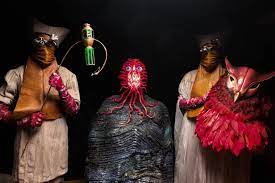 serial killer… and she might be his next victim. (Bruce is waiting for directions from a gigantic man-owl with blood red feathers who tells him who he should kill). Can Mer fight him off? And where do those strange voices come from?
serial killer… and she might be his next victim. (Bruce is waiting for directions from a gigantic man-owl with blood red feathers who tells him who he should kill). Can Mer fight him off? And where do those strange voices come from?
A Wounded Fawn is a low budget, exquisitely-crafted art-house thriller horror. What starts as a simple slasher, soon turns into a revenge pic about halfway through, where Meredith, Kate and a third victim return as the Furies to visit punishment upon Bruce. What’s really remarkable is how it incorporates greco-roman aesthetics, mythology and theatre into what could have been a simple scary horror movie, to turn it into something totally original. While it’s not always clear whether something happens for real, or just inside Bruce’s damaged brain, it doesn’t matter. A Wounded Fawn is weird and fascinating, either way.
Dir: Michael Showalter
It’s the 1990s. Michael Ausiello (Jim Parsons) is a nerdy gay guy who lives in NJ but works in Manhattan. He grew up obsessed by TV, living his life as if he were a character on an 80s sitcom. Now he’s a writer for TV Guide, where he devotes himself to work and remains perpetually single. Until he meets Kit Cowan (Ben Aldridge) at a dance club — he’s handsome, fit and popular and says Michael is just his type —a tall geek. Kit’s also in the media — he’s a professional photographer. They hit it off, but keep certain secrets to themselves. Kit lives a free-wheeling sex life — he’s not one to settle down. And Michael never came out to his small-town parents (Sally Field and Bill Irwin); he’s afraid they won’t accept him. And he’s afraid to show Kit his apartment. What is he hiding there? His Smurf collection; a veritable fuzzy blue tsunami filling every nook and cranny. But after settling their deferences, they eventually move in together. Most of the Smurfs are packed away, Michael comes out to his parents (they still love him) and they settle into domestic bliss.
Flash forward 15 years, and their relationship is on the rocks; the spark has died and they’ve grown a bit distant toward each other. But everything changes when — spoiler alert! — Kit discovers he has terminal cancer. Can they handle his 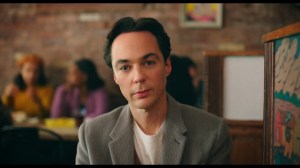 imminent death? Will their love be rekindled? And how will they spend what might be their last year together?
imminent death? Will their love be rekindled? And how will they spend what might be their last year together?
Spoiler Alert is a touching dramady about love and loss, based on a true story — Michael Ausiello’s own memoir of his life with Kit. Like the book, the movie begins with the death of Kit in Michael’s arms, hence “spoiler alert”. The director Michael Showalter, previously made The Big Sick, also about a couple and their family facing a serious illness. So is this the gay Big Sick? Not exactly — it’s a new story with a different style, like his version of Michael’s childhood as a sitcom, complete with laugh-track. And there are lots of funny parts. The bigger question is, is Jim Parsons up to playing a dramatic role, or is he forever stuck in peoples’ minds as Sheldon on the Big Bang? In this case, I think he pulls it off. He fits the role and manages to make him quirkily sympathetic. So if you’re into terminal illness comedies, here’s a good one to try on for size.
Wri/Dir: Sam Mendes
Its the winter of 1981 in a sea-side city in southern England. Hilary (Olivia Coleman) is a middle-aged woman who works at the Empire Theatre as the front of house manager. It’s an art-deco movie palace, but like the town, it’s long past its prime. Half the screens are closed and the third floor ballroom has been taken over by pigeons. Hilary is lonely and depressed, on meds, recovering from a hospital stay. Her social life consists of ballroom dancing with old men, and her sex life is furtive encounters with her sleazy, married boss (Colin Firth) in his darkened office.
But her life changes when a young man, Stephen (Michael Ward) is hired to work there. She finds him attractive, ambitious (he wants to study architecture at university)` and compassionate: he nurses a wounded pigeon back to health. He’s mom’s a nurse, from the Windrush generation, but he wants more. Hillary may be his mom’s age but there’s something there. After a few intimate moments they start a clandestine relationship. But Michael’s real ambition is to leave this town — to escape increasingly racist street violence (he’s black), and to become more than just an usher. Can their 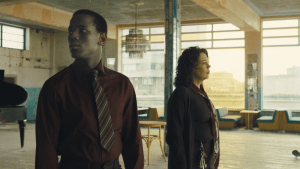 relationship last? And if they break up, can the fragile Hilary handle it?
relationship last? And if they break up, can the fragile Hilary handle it?
Empire of Light is a romantic time capsule of life in Thatcher’s England. It’s also about the joy and troubles of an intergenerational, mixed-race love affair. And it’s also about sexual harassment and anti-black racism in everyday life. And it’s also about Hillary’s mental illness, including her sudden, manic episodes. And it’s also about the rise of skinheads and the National Front, and the concurrent anti-racist ska revival. And it’s also about the collective friendship that develops among the people working at the Empire theatre. (Maybe too many ands for one movie?)
Like many of Sam Mendes films (which I generally don’t like), it’s pandering and emotionally manipulative and has a meandering storyline, that keeps you watching while it’s on, but  leaves you feeling vaguely unsatisfied afterwards. But the acting is really good, especially Olivia Coleman and Michael Ward, who rise above the movie’s many flaws. Maybe even good enough to make Empire of Light worth a watch, despite all its problems.
leaves you feeling vaguely unsatisfied afterwards. But the acting is really good, especially Olivia Coleman and Michael Ward, who rise above the movie’s many flaws. Maybe even good enough to make Empire of Light worth a watch, despite all its problems.
Empire of Light and Spoiler Alert both open this weekend in Toronto; check your local listings. And A Wounded Fawn is now streaming on Shudder.
This is Daniel Garber at the Movies, each Saturday morning, on CIUT 89.5 FM and on my website, culturalmining.com.
Smiles and frowns. Films reviewed: Smile, Triangle of Sadness
Hi, this is Daniel Garber at the Movies for culturalmining.com and CIUT 89.5 FM.
Weather changes with the seasons and so do our moods: one minute it may be sunny, the next dark and overcast. So this week I’m looking at two new movies about changing emotions. There’s a comedy about a frown and a horror movie about a smile.
Wri/Dir: Parker Finn
Dr Rose Cotter (Sosie Bacon) is a therapist who works in the emergency psych ward at a large New Jersey hospital. She’s always prim and proper, wearing buttoned shirts, with her hair neatly pulled back from her face. She spends most of her time at work, up to 80 hours a week, but on her free time she likes nothing better than sipping white wine in her bungalow, cuddling her fluffy cat Moustache or just chatting with Trevor, her nondescript fiancé. She is devoted to helping her patients, having survived her own mother’s mental illness and suicide when she was a little girl.
It’s just a normal day when she examines a new patient in intake. Laura is a grad student showing signs of paranoid delusions. She is terrified that someone is out to get her. “I’m not crazy, I’m a PhD candidate!” says Laura (as if the two were mutually exclusive). She’s not sure whether it’s an evil spirit, a ghost or a satanic possession, but whatever it is, it’s been haunting her since she witnessed her prof commit suicide just a few days earlier. It takes the form of people closest to her, 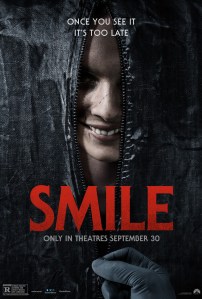 that only she can see. And worst of all, it has a horrible smile. And before Rose can do anything, Laura violently kills herself right in front of her… with that awful smile plastered on her face. And from that moment on things feel different for Rose.
that only she can see. And worst of all, it has a horrible smile. And before Rose can do anything, Laura violently kills herself right in front of her… with that awful smile plastered on her face. And from that moment on things feel different for Rose.
Her nightmares turn into daydreams. She begins to hallucinate — with figures from her past, including a dead patient, reappear before her, smiling. She has very few people to talk to outside of the hospital: Trevor, and her older sister Holly, who only talks about family and real estate. She visits her own former therapist, who refuses to prescribe anti-psychotics, saying it’s just stress and overwork. But Rose knows it’s something more. Everything that happened to Laura — and her professor before her — seems to be inflicted on Rose now. She finally turns to her ex-boyfriend 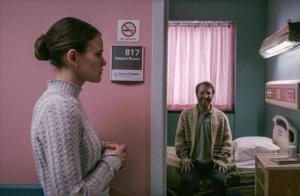 Joel (Kyle Gallner) for help. He’s a police detective now, investigating Laura’s death; perhaps he can find out what’s causing these suicides. Because Rose is sure she’s either going insane, or is controlled by an evil entity… or both! And if she doesn’t do something fast, she’ll be dead in three days. Can Rose figure out what’s happening to her, and stop her impending, smiling suicide? Or is she out of time?
Joel (Kyle Gallner) for help. He’s a police detective now, investigating Laura’s death; perhaps he can find out what’s causing these suicides. Because Rose is sure she’s either going insane, or is controlled by an evil entity… or both! And if she doesn’t do something fast, she’ll be dead in three days. Can Rose figure out what’s happening to her, and stop her impending, smiling suicide? Or is she out of time?
Smile is a good psychological thriller/horror. While it’s occasionally predictable — with some dubiously freudian plot  turns — it’s mainly a gripping, scary flick. Great spooky music and some cool visuals, like disorienting, upside down drone shots of a cityscape, and a delightful scene change using the camera’s iris. And lots of cute, smiley-face images popping up everywhere in the background. I’ve never seen Sosie Bacon before, (she’s second generation Hollywood, the daughter of Kevin Bacon and Kyra Sedgwick) but she’s quite good as Rose, gradually transforming from uptight doctor to terrified heroine.
turns — it’s mainly a gripping, scary flick. Great spooky music and some cool visuals, like disorienting, upside down drone shots of a cityscape, and a delightful scene change using the camera’s iris. And lots of cute, smiley-face images popping up everywhere in the background. I’ve never seen Sosie Bacon before, (she’s second generation Hollywood, the daughter of Kevin Bacon and Kyra Sedgwick) but she’s quite good as Rose, gradually transforming from uptight doctor to terrified heroine.
If you’re in the mood for a good screamer, check out Smile.
Wri/Dir: Ruben Östlund
Yaya and Carl (Charlbi Dean, Harris Dickinson) are a millennial power couple. Carl is a fashion model who is featured shirtless in perfume and underwear ads. He is known for his looks. But he still has to show up for cattle-calls. Yaya, though, is an influencer — her posts and selfies are followed by millions, and sponsors are constantly sending her money and goods to promote. But their unequal status spurs an argument. Why does he have to pick up the cheque when they go out to dinner? He’s the man in the relationship but Yaya is much more famous and earns way more money than Carl. It’s just not fair. So she invites him to join her on an elite cruise ship, all expenses paid.
The boat is an exclusive luxury liner, and the passengers are some of the richest people in the world. One couple made billions selling bombs and landmines. Another oligarch, named Dimitri (Zlatko Buric) proudly says he earned his fortune selling shit — literally. He cornered the market in fertilizer. And the staff are trained by Paula, the head of the crew (Vicki Berlin), to fulfill any whims or demands of the passengers no matter how outlandish or nonsensical. And Carl and Yaya soon find out that any casual complaint or criticism of a staff member they might make may lead to their instant dismissal. But the ship hits trouble on the high seas, and the captain (Woody Harrelson), an alcoholic communist, can’t stay sober long enough to prevent a disaster.
Dimitri (Zlatko Buric) proudly says he earned his fortune selling shit — literally. He cornered the market in fertilizer. And the staff are trained by Paula, the head of the crew (Vicki Berlin), to fulfill any whims or demands of the passengers no matter how outlandish or nonsensical. And Carl and Yaya soon find out that any casual complaint or criticism of a staff member they might make may lead to their instant dismissal. But the ship hits trouble on the high seas, and the captain (Woody Harrelson), an alcoholic communist, can’t stay sober long enough to prevent a disaster.
Later, the passengers and staff regroup on a tropical isle, situated somewhere between Gilligan’s Island and Lord of the Flies. But with a new power structure in place, who will make it out of there alive?
 Triangle of Sadness — the title refers to that part of the face from the brow to the bridge of the nose that supposedly conveys happy or sad emotions — is a scathing satire about the state of the world. Told in three chapters — in the city, on a ship, and on a remote island — it follows a young couple as they navigate life among the powerful and super-rich. It also shows what could happen if existing power structures (and the money that reinforces them) ceased to exist. Did I mention this is a comedy? I found it bitingly and bitterly hilarious, though at times disgusting. For humour’s sake, it reverses many presumptions: by presenting men — not women — as sexual objects subject to exploitation; and by pulling away the curtains hiding the transgressions of the rich and powerful.
Triangle of Sadness — the title refers to that part of the face from the brow to the bridge of the nose that supposedly conveys happy or sad emotions — is a scathing satire about the state of the world. Told in three chapters — in the city, on a ship, and on a remote island — it follows a young couple as they navigate life among the powerful and super-rich. It also shows what could happen if existing power structures (and the money that reinforces them) ceased to exist. Did I mention this is a comedy? I found it bitingly and bitterly hilarious, though at times disgusting. For humour’s sake, it reverses many presumptions: by presenting men — not women — as sexual objects subject to exploitation; and by pulling away the curtains hiding the transgressions of the rich and powerful.
The acting in this dark comedy — especially by the late Charlbi 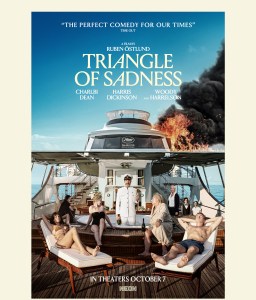 Dean and Harris Dickinson, as well as Zlatko Buric and Dolly De Leon as Abigail a former toilet cleaner who suddenly finds herself as the big fish in a small pond — is excellent all around. The story is told as a comic fable, intentionally never realistic, with settings, costumes, and music, all reinforcing its farcical nature. This is not Swedish director Ruben Östlund first dark comedy — he previously directed such great movies as The Square and Force Majeure — but Triangle of Sadness is the most extreme of all his films, one that takes his themes beyond the expected limits. Though not universally loved, in my opinion this is one great movie.
Dean and Harris Dickinson, as well as Zlatko Buric and Dolly De Leon as Abigail a former toilet cleaner who suddenly finds herself as the big fish in a small pond — is excellent all around. The story is told as a comic fable, intentionally never realistic, with settings, costumes, and music, all reinforcing its farcical nature. This is not Swedish director Ruben Östlund first dark comedy — he previously directed such great movies as The Square and Force Majeure — but Triangle of Sadness is the most extreme of all his films, one that takes his themes beyond the expected limits. Though not universally loved, in my opinion this is one great movie.
Smile is now playing and Triangle of Sadness, which played at #TIFF22 earlier this year, opens at the TIFF Bell Lightbox this weekend.
This is Daniel Garber at the Movies, each Saturday morning, on CIUT 89.5 FM and on my website, culturalmining.com
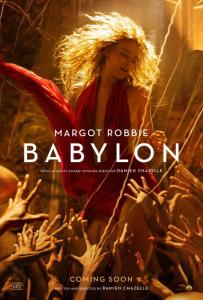




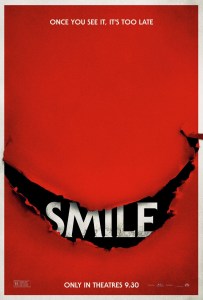
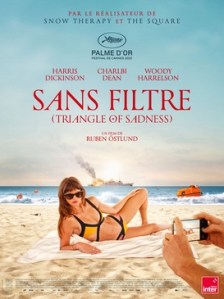
leave a comment